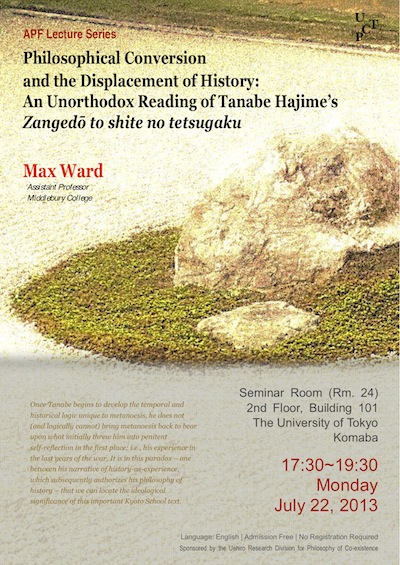
|
Title: | Max Ward "Philosophical Conversion and the Displacement of History"Finished |
||
|---|---|---|---|---|
| Date: | 17:30-19:30, Monday, July 22, 2013 |
Place: | Seminar Room, 2nd Floor, Building 101, University of Tokyo, Komaba |
|
Philosophical Conversion and the Displacement of History:
An Unorthodox Reading of Tanabe Hajime’s Zangedō to shite no tetsugaku (1946)
Prof. Max Ward (Japanese History at Middlebury College, Vermont)
Moderator: Dr. M. Downing Roberts (UTCP)
Abstract:
Tanabe Hajime’s Philosophy as Metanoetics (Zangedō to shite no tetsugaku, 1946) is generally understood as marking a significant transformation in Tanabe’s thought. As Tanabe himself describes in his uncharacteristically personal preface to Metanoetics, this transformation emerged from his experiences in the last years of the Pacific War, where, confronted by the suffering he witnessed around him, and his inability as a philosopher to bring his thought to bear on the situation, he was thrown into a painful process of self-reflection and self-critique. Tanabe conceived his personal experience and the ostensible crisis of philosophy more generally through what he called metanoia (μετάνοια; zange), understood as a circular process of self-negation, repentance, conversion and resurrection inspired by True Pure Land Buddhism (Jōdo shinshū). For Tanabe, metanoia could serve not only as a new model for philosophy – where philosophy became metanoetics (μετανόησίς; zangedō) – but more immediately, as the path for Japan’s national repentance and reconstruction. The result was Tanabe’s call for the complete rethinking of philosophy itself from a religiously-inflected perspective, as Tanabe hoped to push reason to the limits of its own antinomies and, and through a process of negation-and-resurrection, reformulate the philosophical enterprise as a critical practice of “absolute critique” (zettai hihan).
Philosophy as Metanoetics is a bold and complicated work, one that has vexed scholars attempting to situate it within Tanabe’s intellectual trajectory or in relation to Kyoto School thought more generally. My paper focuses on the status of history in the text, and in particular, the narratival function of Tanabe’s personal Preface. The sense of history that emerges from the Preface and which is inherited by subsequent studies is that history remains an external reality to Tanabe’s thought, which, depending on one’s evaluation, Tanabe was either bravely standing up against, or unable to resist its determinations. Furthermore, this sense of history is the primary site in which to interpret (or deny) the ideological significance of the text. In contrast, I will locate history and the ideological significance of Metanoetics internal to the text itself; namely, at the level of its formal structure and how history is formally displaced from philosophical reflection. I will argue that once Tanabe begins to develop the temporal and historical logic unique to metanoesis, he does not (and logically cannot) bring metanoesis back to bear upon what initially threw him into penitent self-reflection in the first place. And it is in this paradox – one between his narrative of history-as-experience (Preface), which subsequently authorizes his philosophy-of-history (metanoetics) – that I contend we can locate the political significance of this important Kyoto School text.
Biography
Max Ward is Assistant Professor of Japanese History at Middlebury College, Vermont. His research interests include Japanese social and intellectual history, critical theory, and theories of colonial- and postcolonial-formations. He is currently writing on a number of topics, including Kyoto School philosophy, the institutionalization of tenkō in the 1930s, and wartime imperial ideology.
Language: English | Admission Free | No Registration Required
Organized by L1 Project, Uehiro Research Division for Philosophy of Coexistence, The University of Tokyo Center for Philosophy (UTCP)







